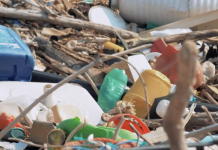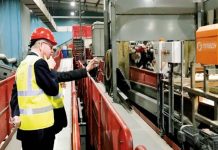
To create a circular economy for reusable and recyclable environment-friendly food packaging containers, InfinityBox, a sustainable packaging-as-a-service company in India, has developed packaging solutions that help minimize waste.
The company addresses the problem of excessive plastic waste generated by single-use packaging, which has a detrimental impact on the environment. By streamlining the food operations for large corporations, enterprises, colleges, and schools, the company claims to reduce the consumption of waste, electricity, chemicals, and manpower through the efficient use of technology.

“The primary focus of InfinityBox is to offer a comprehensive packaging-as-a-service solution to businesses, corporate enterprises, and cafeterias. Instead of relying on disposable packaging or traditional reusable plates, InfinityBox provides a wide range of reusable high-quality and hygienic serviceware options,” says Shashwat Gangwal, CEO and founder, InfinityBox.
InfinityBox says the key differentiator lies in its end-to-end approach. Once the serviceware is used, the company collects it, washes it thoroughly, and ensures its proper sterilization and maintenance. This process allows the serviceware to be ready for reuse in an efficient and convenient manner.
Established in 2020, the company says it is working with more than 80 clients such as Morgan Stanley, Piramal Group, Narayana Hospitals, Aster Hospital, and many more with a 100% customer retention rate. The company offers its service to food delivery services and helps streamline operations at corporate spaces, hospitals, and universities by providing a wide selection of eco-friendly packaging materials, including steel, ceramic, PP(polypropylene), and acrylic containers, as well as chafing dishes and more.
“Operating on a large scale, catering to the needs of businesses and institutions, we encourage the adoption of the circular economy model, aiming to inspire a positive shift in consumer behavior and corporate practices, ultimately fostering a more sustainable future,” Gangwal said.
In Bangalore and Mumbai, while ordering from a partner restaurant, the customer can opt for InfinityBox containers. Once the order is delivered in the InfinityBox packaging, the customer can schedule a pick-up time for the container or can drop it at a smart bin nearby. The boxes collected by the team of InfinityBox are washed and sanitized before being reused.
Gangwal says the lack of significant capital investment and the reluctance to accept new ideas are holding back the growth of sustainable packaging methods. “Cafeterias have been operating in the same way for decades, making it challenging for them to shift toward sustainable practices. Moreover, implementing sustained action plans requires significant capital investment, which is difficult. Additionally, mindset changes can be daunting, hindering the acceptance of new ideas. While many players globally are embracing sustainable practices, not everyone readily accepts the shift. However, a focus on cost-reduction benefits can drive experimental trials and gradually lead to wider acceptance worldwide,” Gangwal said.
As the consumer becomes more conscious, and with governments and businesses prioritizing environmental responsibilities, Gangwal believes that adopting sustainable packaging practices has become a crucial aspect of staying competitive and meeting the evolving market demands. “It is not only a responsible choice for the future but also an urgent necessity to safeguard our planet for generations to come.”
InfinityBox is currently live in three cities and plans to expand to 10 more. “Being the only sustainable packaging-as-a-service company in India with a few counterparts in the US and European countries, we believe in trust in the quality of the service that we provide. The quality and safety of the food is a huge concern for everyone. We try to keep building on the relationships that we have and expand aggressively,” Gangwal said.









